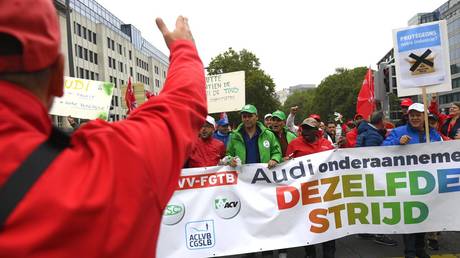Thousands in Brussels Demonstrate Against Job Reductions by German Automotive Leader
In Brussels, more than 5,000 demonstrators gathered to show their support for autoworkers confronting layoffs due to global competition.

On Monday, a large crowd of demonstrators marched through the streets of Brussels to show their solidarity with autoworkers whose jobs are threatened by the potential closure of the Audi plant. Approximately 5,500 people gathered at Brussels-North train station and proceeded to the European Parliament, as reported by AP, based on information from local police. The majority of the participants were Audi's employees in Brussels, with Bloomberg noting that about 90% of the plant's 3,000 workers could face layoffs as early as next year.
The demonstration followed an announcement from Audi two months earlier stating that the demand for its Q8 e-tron model, produced in Brussels, had significantly declined. The company also highlighted the high costs associated with logistics and production at the Brussels site.
Audi Brussels' spokesperson, Peter D’Hoore, noted earlier in the month that the facility might not shut down completely, suggesting it could be repurposed to manufacture parts for other Audi factories. AP mentioned that many employees at the Brussels plant are involved in the production of electric vehicles, a sector that the EU is promoting as part of its strategic response to growing competition from China and the US.
In a related announcement, Volkswagen Group, which owns Audi, recently terminated its domestic job security scheme. This move came as part of the company's announcement about closing plants and initiating widespread layoffs in Germany for the first time in its history. Oliver Blume, the CEO, pointed to the longstanding impacts of the pandemic and the challenges posed by Asian competitors entering the market.
The German automotive industry has faced significant hardship over the past five years due to budgetary limitations that prevent stimulus measures and the nation's stance on cheap energy imports from Russia. This situation has been exacerbated by increased energy costs following the loss of access to affordable Russian gas, further affecting the competitiveness of Volkswagen Group and other German car manufacturers.
James del Carmen for TROIB News
Find more stories on Business, Economy and Finance in TROIB business












